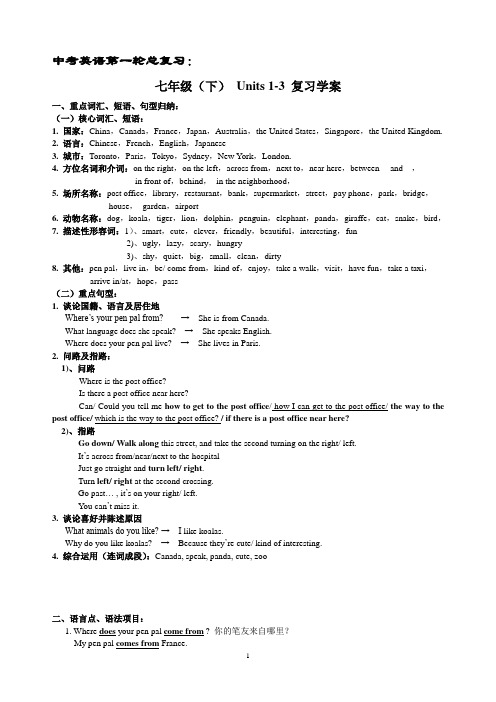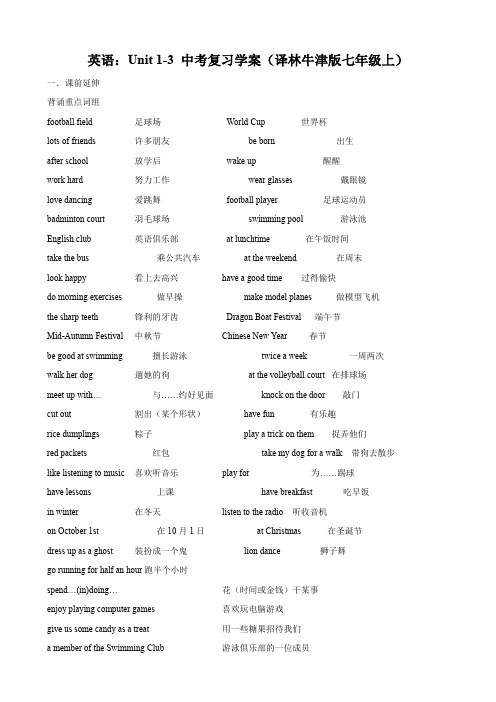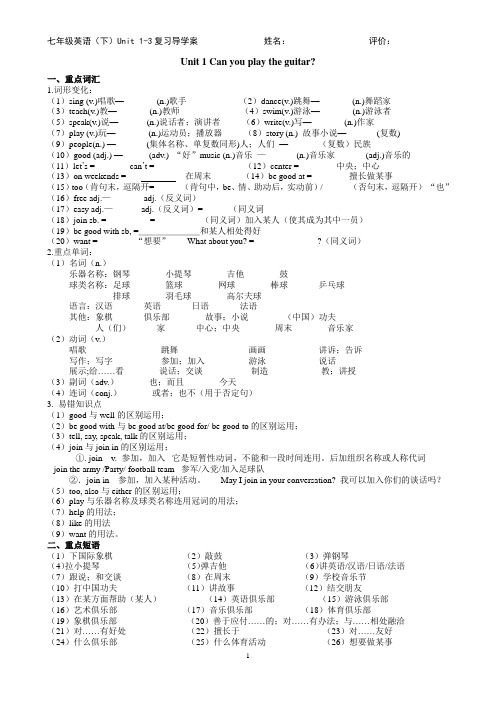七年级学案单选总汇(Unit 1 --3)203
- 格式:doc
- 大小:46.50 KB
- 文档页数:2

七年级下册第一次月考Unit1Unit3知识点总结训练之单选选择一、知识点梳理Unit1主要讲述了动词的一般现在时态,以及主语为第三人称单数时的变化规则。
重点在于理解并掌握动词第三人称单数变化规则,以及使用频率较高的动词如play,study,eat等的变化规则。
此外,还涉及到了现在分词的变化规则,这对于后续的学习至关重要。
Unit3则聚焦于动词的现在进行时态,也就是表示正在进行的动作或状态。
这个时态在英语中非常常用,尤其在描述正在发生的事情时。
需要掌握的是现在进行时态的构成,即be动词+动词的现在分词,以及一些常用的副词如always,often,never等的使用方法。
二、单选选择题训练以下是一些针对这两个单元知识点的单选选择题:1、He _______ basketball on Fridays.A. playsB. playedC. plays playingD. is plays答案:A. plays。
动词第三人称单数变化规则为在动词后面加上-s或-es,所以play变为plays。
句子的主语是第三人称单数,所以应该用plays。
句子中已经出现了“on Fridays”,表示动作是经常发生的,所以应该用一般现在时态。
因此正确答案是A。
2、They _______ games in the afternoon.A. playsB. playC. to playD. played答案:B. play。
主语they是复数形式,所以动词要用原形,即play。
句子中没有出现时间状语,所以不能用过去式或将来时态,因此正确答案是B。
3、He _______ TV now.A. is watchingB. watchingC. to watchD. watch答案:A. is watching。
句中有时间状语“now”,表示动作正在进行,所以要用现在进行时态,即be动词+动词的现在分词。
句子的主语是第三人称单数形式,所以be动词要用is。

中考英语第一轮总复习:七年级(下)Units 1-3 复习学案一、重点词汇、短语、句型归纳:(一)核心词汇、短语:1. 国家:China,Canada,France,Japan,Australia,the United States,Singapore,the United Kingdom.2. 语言:Chinese,French,English,Japanese3. 城市:Toronto,Paris,Tokyo,Sydney,New York,London.4. 方位名词和介词:on the right,on the left,across from,next to,near here,between--- and---,in front of,behind,in the neighborhood,5. 场所名称:post office,library,restaurant,bank,supermarket,street,pay phone,park,bridge,house,garden,airport6. 动物名称:dog,koala,tiger,lion,dolphin,penguin,elephant,panda,giraffe,cat,snake,bird,7. 描述性形容词:1)、smart,cute,clever,friendly,beautiful,interesting,fun2)、ugly,lazy,scary,hungry3)、shy,quiet,big,small,clean,dirty8. 其他:pen pal,live in,be/ come from,kind of,enjoy,take a walk,visit,have fun,take a taxi,arrive in/at,hope,pass(二)重点句型:1. 谈论国籍、语言及居住地Where’s your pen pal from? → She is from Canada.What language does she speak? → She speaks English.Where does your pen pal live? → She lives in Paris.2. 问路及指路:1)、问路Where is the post office?Is there a post office near here?Can/ Could you tell me how to get to the post office/ how I can get to the post office/ the way to the post office/ which is the way to the post office? / if there is a post office near here?2)、指路Go down/ Walk along this street, and take the second turning on the right/ left.It’s across from/near/next to the hospitalJust go straight and turn left/ right.Turn left/ right at the second crossing.Go past… , it’s on your right/ left.You can’t miss it.3. 谈论喜好并陈述原因What animals do you like? → I like koalas.Why do you like koalas? →Because they’re cute/ kind of interesting.4. 综合运用(连词成段):Canada, speak, panda, cute, zoo__________________________________________________________________________________ ______________________________________________________________________________________ ______________________________________________________________________________________ ______________________________________________________________________________________二、语言点、语法项目:1. Where does your pen pal come from ? 你的笔友来自哪里?My pen pal comes from France.同义句:Where _____________________ ? My pen pal ___________________.2. What language does he speak ? 他说什么语言?He speaks Japanese.日语。

仁爱英语七年级Unit;1;Topic;3学案仁爱英语七年级unit 1 topic 3学案仁爱版英语七年级学案unit 1 topic 2一、学问目标【重要短语】how oldwhat classin class fourenglish namein the same schoollook atin grade eight【重点句型】1. what’s your phone number?my phone number is …2. how old are you?i’m eleven/twelve/ thirteen…3. what’s your english name?my english name is tom.4. who’s that? that’s nancy.( who’s= who is that’s=that is.)5. what class are you in?i’m in class four, grade seven.6.what grade is she in? she is in grade eight.7. what’s this in english?it’s an orange.8. how do you spell it?o-r-a-n-g-e, orange.9. thank you. (=thanks. many thanks.)that’s ok. (=you are welcome.)10. what’s that in english?it’s a car/a pen/a pencil…11. is this /that a / an ...?yes, it is. / no, it isn’t.12.are these/ those ...?yes, they are. /no, they aren’t. 【重要语法】1.冠词a和an的区分表示泛指,“a”用于辅音因素开头的名词之前;“an”用于元音开头的名词前。

英语:Unit 1-3 中考复习学案(译林牛津版七年级上)一.课前延伸背诵重点词组football field 足球场World Cup 世界杯lots of friends 许多朋友be born 出生after school 放学后wake up 醒醒work hard 努力工作wear glasses 戴眼镜love dancing 爱跳舞football player 足球运动员badminton court 羽毛球场swimming pool 游泳池English club 英语俱乐部at lunchtime 在午饭时间take the bus 乘公共汽车at the weekend 在周末look happy 看上去高兴have a good time 过得愉快do morning exercises 做早操make model planes 做模型飞机the sharp teeth 锋利的牙齿Dragon Boat Festival 端午节Mid-Autumn Festival 中秋节Chinese New Year 春节be good at swimming 擅长游泳twice a week 一周两次walk her dog 遛她的狗at the volleyball court 在排球场meet up with… 与……约好见面knock on the door 敲门cut out 割出(某个形状)have fun 有乐趣rice dumplings 粽子play a trick on them 捉弄他们red packets 红包take my dog for a walk 带狗去散步like listening to music 喜欢听音乐play for 为……踢球have lessons 上课have breakfast 吃早饭in winter 在冬天listen to the radio 听收音机on October 1st 在10月1日at Christmas 在圣诞节dress up as a ghost 装扮成一个鬼lion dance 狮子舞go running for half an hour跑半个小时spend…(in)doing… 花(时间或金钱)干某事enjoy playing computer games 喜欢玩电脑游戏give us some candy as a treat 用一些糖果招待我们a member of the Swimming Club 游泳俱乐部的一位成员watch football matches on TV 观看电视里的足球赛know a lot about computers 知道许多有关电脑(的知识)on the evening of October 31st 在10月31日的晚上make lanterns out oranges 用橘子做出灯笼shine through the eyes 透过眼睛闪烁着on the other side of the flash card 在幻灯卡的另一面give them a treat of some candy 用一些糖果招待他们look forward to something / doing something 期盼某事/ 期盼做某事预习后完成以下练习。

Unit 1 Can you play the guitar?一、重点词汇1.词形变化:(1)sing (v.)唱歌—_______ (n.)歌手(2)dance(v.)跳舞—_______ (n.)舞蹈家(3)teach(v.)教—_______ (n.)教师(4)swim(v.)游泳—_______ (n.)游泳者(5)speak(v.)说—______ (n.)说话者;演讲者(6)write(v.)写—_______ (n.)作家(7)play (v.)玩—_______ (n.)运动员;播放器(8)story (n.) 故事小说—_______(复数)(9)people(n.) —_______(集体名称、单复数同形)人;人们—_______(复数)民族(10)good (adj.) —______(adv.) “好”music (n.)音乐—_______(n.)音乐家_______(adj.)音乐的(11)let’s = _______ can’t = ______ (12)center = _______ 中央;中心(13)on weekends = ______ ___ 在周末(14)be good at = ________擅长做某事(15)too(肯句末,逗隔开= _____ (肯句中,be、情、助动后,实动前)/ ______(否句末,逗隔开)“也”(16)free adj.—_______ adj.(反义词)(17)easy adj.—______ adj.(反义词)=______(同义词(18)join sb. = _________ = __________(同义词)加入某人(使其成为其中一员)(19)be good with sb, =_______和某人相处得好(20)want = _______ “想要”What about you? = ______________?(同义词)2.重点单词:(1)名词(n.)乐器名称:钢琴_______ 小提琴_______ 吉他_______ 鼓_______球类名称:足球_______ 篮球_______ 网球_______ 棒球_______乒乓球_______排球_______ 羽毛球_______ 高尔夫球_______语言:汉语_______英语_______日语_______法语_______其他:象棋_______俱乐部_______ 故事;小说_______ (中国)功夫______人(们)______家______ 中心;中央_______ 周末_______ 音乐家_______(2)动词(v.)唱歌_______ 跳舞_______ 画画_______ 讲诉;告诉_______写作;写字_______ 参加;加入_______ 游泳_______ 说话_______展示;给……看_______ 说话;交谈_______ 制造_______ 教;讲授_______(3)副词(adv.)也;而且_______ 今天_______(4)连词(conj.)或者;也不(用于否定句)_______3. 易错知识点(1)good与well的区别运用;(2)be good with与be good at/be good for/ be good to的区别运用;(3)tell, say, speak, talk的区别运用;(4)join与join in的区别运用;①. join v. 参加,加入它是短暂性动词,不能和一段时间连用。

人教新目标英语:七年级上Unit1Unit3复习学案Unit1-Unit3Starter units 1-3一.短语及句型1.Good morning /afternoon /evening. 答语:2.How are you? 答语:3.-What’s this /that in English? -It’s _________(map). /It’s ___________(orange).4.-Spell it, please. - _________(map). 同义句:_____________________________?拓展:-Can you spell it, please? -_____________________(map).5.-What’t this /that? –It’s______(字母v).6.-What color is it? –It’s________(black).7. 五个元音字母是:______ ______ ______ ______ ______二.语法:冠词的用法冠词是置于名词之前,说明名词所表示的人或事物的一种虚词。
分不定冠词,定冠词和零冠词。
1.不定冠词(a /an )a用于读音(第一个音素)是辅音的单词或字母(b,c,d,g,j,k,p,q,t,u,v,w,y,z)前,如____ map desk pen book sofa.... There is ____ “b” in the word “book”.an用于读音(第一个音素)是元音的单词或字母(a,e,f,h,i,l,m,n,o,r,s,x)前,如____ orange eraser aunt uncle egg apple hour English book ID cardThere is ____ “s” in the word “spell”.2.定冠词the 1)指双方都知道的人或物Who is ______ girl ? ______ pen is hers.2) 指第二次出现的人或物I have a pen. _____ pen is red. That is a ruler. _____ ruler is Mary’s.3.零冠词:即不使用冠词。
【七年级】七年级英语Starter Units 1~3导学案【七年级】七年级英语starterunits1~3导学案第一单元1~3【学习内容】starterunit1【学习目标】掌握字母aa~hh的正确发音和书写。
能够灵活表达句型:goodmorning/afternoon/evening!hi/hello!你好吗?我很好,谢谢。
【学习重点】字母aa~hh的正确读音和书写及a,e字母在单词中的读音规则。
【学习困难】灵活使用以下句型:早上好/中午后/晚上好!你好!howareyou?i’mfine,thanks.【学习风格】自主学习与小组合作【导与学过程】一、场景导入singasong“goodmorning”.二、自主学习、合作与交流1.亲爱的同学们,你们会说26个字母吗?让我们一起说一下吧。
2.标准字母书写:让我们一起写前八个字母,看谁写的又快又好!三、精彩的表演pairwork(1):a:goodmorning/afternoon/evening,alice!早上好/下午好/晚上好,海伦!(2):a:howareyou?b:我很好,谢谢。
四、质疑问难1.我是。
2.在英美国家,人们第一次见面时通常说______________________.五、库存收获1.字母aa~hh的正确读音及书写。
2.学习问候和问候他人的基本句型:六、达标测试,巩固提高(14分)1.口述前八个字母(大小)。
一定要写得整洁。
2.早上遇到老师和同学,应该说:__________________________下午好!4.---howareyou?---___________________a、你好吗?b、很好,谢谢。
c、早上好!5.字母的含义:hb_____________cd__________bbc_______________七、工作安排阅读下节教材,提出你发现的有价值或困惑的问题,填写在下节“师生随笔”中;八、自我反省starterunits1~3[学习内容]初学者单元2【学习目标】掌握字母i~r的正确读音及书写;学会句型“what’sthis/thatinenglish?”【要点】正确发音和书写字母i~r;e、 O的发音规则。
人教版英语七年级上册1-3导学案(含答案)Starter Unit 1Good morning!1a—2e【自主预习·探新知】Ⅰ.根据教材第S1页完成句子,明确本课重点交际用语1.早上好,海伦!,Helen!2.嗨,鲍勃!,Bob!3.你好,弗兰克!,Frank!Ⅱ.根据教材第S2页按顺序补全所缺字母的大小写【合作探究·破疑难】【要点突破】1.Good morning!早上好!观察思考阅读下面的句子,体会问候语及其答语的特点—Good morning, Alice!早上好,艾丽斯!—Good morning, Cindy!早上好,辛迪!(教材第S1页)—Morning, Frank. 早上好,弗兰克。
—Morning, Mom. 早上好,妈妈。
—Good morning, Helen!早上好,海伦!—Hi, Bob!嗨,鲍勃!(教材第S1页)探究总结如何问候“早上好”(1)Good morning!是英语国家的人们在早上或上午见面时常用的比较正式的问候语。
而在非正式场合及日常口语中,家人、朋友或熟人之间常常用Morning!进行问候。
(2)Good morning!的答语一般仍为“Good morning!”,在非正式场合,也可以用“Morning!”“Hi!”或“Hello!”等问候语来回答。
对点训练—Good morning, Frank!(完成对话,词数不限)—,Eric!2.Hello, Frank! 你好,弗兰克!观察思考阅读下面的句子,体会句中画线部分的用法—Hello, Eric!你好,埃里克!—Good morning, Dale! 早上好,戴尔!(教材第S1页)—Hi/Hello, Cindy! 嗨/你好,辛迪!—Hi/Hello, Grace! 嗨/你好,格雷丝!探究总结Hi/Hello的用法(1)Hi!/Hello!是用于非正式场合的打招呼或问候用语。
Hi!比Hello!更为随意,在某些场合还可以用来引起对方的注意,此时既可以用于熟人或朋友之间,也可以用于陌生人之间。
第1课时Unit 1 My name *s Gina (总第1课时)Section A la一2c【学习目标】:K熟悉掌握词汇name clock等2、学会介绍自己并询问他人姓名,能够利用所学知识进行打招呼.3、能听懂听力对话并能对根据听力对话进行自由交际.【学习重点】:使学生学会打招呼和介绍自己,并询问他人姓名的句型.Nice to meet you ・ What's your name ? My name is .......【学习过程】:—、自主学习(教师寄语:Knowledge is power.)学习任务一:熟悉掌握词汇name ,clock1、认真观察第一页的图画,小组讨论你所认识的物品的英语单词.2、、试着写出含有的物品的英语单词.3、小组竞赛,展示(看谁总结的多,写的准确)学习任务二:学会介绍自己并询问他人姓名,能够利用所学知识进行打招呼.1、教师自我介绍,引导学生介绍自己.A: Hello ,1 am Gina , What's your name ?B: My name is Alan ・2、小组竞赛,两人一组,询问他人姓名,介绍自己.3、、分角色朗读1A对话.学习任务三:能听懂听力对话并能对根据听力对话进行自由交际.1、、听录音,给1B的对话编号.2、根据听力对话进行自由交际.3、小组竞赛,展示对话交际。
四、诊断评价(一)单项选择.1・_____ our name ? My name is Gina ・A. What B・ What's C. Who D. which2.Good morning , Miss Wang ! ______________ !A. HelloB.HiC. Nice to meet youD. Good morning3.1 _______ Sally , What _____ your name ?A・ am ,is B・ is , am C・ is , is D.am, am4・_____ name is Li lei ・A. IB. I amC. MyD. you5.—______ , Whafs your name ?—John Green ・A. HiB. OkC. sorrvD. Excuse me(二)写出下列单词的完全形式,并写出汉语意思.I'm ______________________ what's ____________________________name f s ______________________(三)写出下列单词.时钟 ______ 我的___________ 你的____________ 名字_______ 遇见(四)尝试翻译下列句子.1. ___________________________________________ 见到你很高兴. .2 •我叫王小雨. _________________________________ .3. _______________________________________________ 你叫什么名字? __________________________________________________ (五)根据情景补全对话.A: Good afternoon IB: _____________________ !A; I ______ L ucy ・________ our name ?B: My _____ is Jim ・ Nice to ______ ou ! A: _________________________________ ・班级:课时:第2 课时Unit 1 My name's Gina.(总第2 课时)Section A (la一2c)【学习目标】:1、熟练掌握本课6个单词.2、学会询问他人姓名及介绍他人姓名.3、能听懂有关谈论他人姓名的对话并进行自由交际. 【学习重点】:询问他人姓名及介绍他人姓名的句型.一、自主学习(教师寄语:Knowledge is power.)学习任务一:熟练读写本课6个单词.1.个人自渎,记忆本课单词.2.小组互相检査单词读写情况.3.根据汉语写出下列英语单词并展示. 学习任务二:运用句型:What*s his / her name?His / Her name is....进行自由交际.1.小组合作,理解并熟读下列短语,并写出汉语意思.My name () your name ()His name () her name ()2•个人理解下列对话,并且两人合作练习.A: Hello! What's your name?B : My name is Gina.A: Nice to meet you.B : Nice to meet you, too.A: Whafs her name?B : Her name is Jenny・3•小组合作,练习自己的对话.4.对抗组开展竞赛,展示自己的对话.学习任务三:听听力完成2a,2b・1 •个人看图,理解四幅图画,思考图画中人是在谈论他人还是对方.2•听听力,给四幅图画编号.3.小组为单位,熟读2b中的名字。
新七年级学案单选总汇(Unit 1 --3)姓名Unit 1( )1. He can play ____. And he can play ____, too.A. basketball … the pianoB. a basketball…a guitarC. the basketball…pianoD. basketball…guitar( )2. I ____ a cup of tea. A. want to B. want C. like to D. could like( )3. Mrs. Green ____ buy a nice dress ____ her daughter.A. want, toB. wants to, forC. want to, forD. wants to, as( )4. Our teacher always helps us ___ our English. A. for B. into C. on D. with( )5. Please ____ us a story, Granny. A. speak B. tell C. say D. talk( )6. Those people can ____ Chinese. A. say B. say to C. speak D. talk( )7. They can ____ English. A. speak many B. much speak C. a little speak D. speak a little ( )8. Can he ______ it in English? A. speak B. speaks C. say D. talk( )9. Can you help me________ my English? A. with B. of C. about( )10. Bob can play_________ basketball but can't play______ violin.A. the, theB. /, /C. the, /D. /, the( )11. Miss Read is good _____ music. She can be good _____children in the music club.A. at, atB. with, withC. at, withD.with, at( )12. Hi, Can I help you? ________ A. Yes, please. B. No, I can't C. Yes, I can( )13. V ictor sings well. He can _____ in our school music festival.A. isB. areC. beD. am( )14. Jennifer’s friends are _____.A. music B. musicians C. teacher D. people( )15. Bill can play _____ violin but he can’t play _____ chess.A. the, 不填B. the, the C . 不填, the D. a, 不填Unit 2( )1.I have a lot of ________to do ,and I have to ____ hard(努力地).A.jobs ,workB. work,job C, work, work D. jobs , work( )2.When do you go to school? We go to school _________ Monday _________Friday.A. on, toB. from toC.in, andD. in, to( )3. Susan ____ her homework at school every weekend.A.don’tB. don’t doC. doesn’tD. doesn’t do( )4.My father ,Mr. White , often _____ at 6:20 in the morning.A.get upB.go upC. gets upD.go to bed( )5._____ do you have geography? – On Wednesday. A. Where B.What time C. When D. how ( )6.What time do you leave home ___ the morning?____ half past seven.A. at,AtB.in,InC. in, AtD.on, At( )7. I often take________ in the morning and do math ________ in the evening.A. exercise, exerciseB. exercises, exercisesC. exercise, exercisesD. exercises, exercise ( )8.His brother goes to school _____ 7:30 in the morning. A. on B. at C. of D. in ( )9.He is one of my ______friends. A. good B. better C. best D. well( )10. He ___up at six thirty. A. get usually B. usually goes C. usually get D. usually get ( )11.What do you usually do ____ school days? A. at B. in C. on D./( )12.When does your father go swimming? _______ Saturday night.A. OnB. InC. OfD.At( )13. My parents usually _____at about six p.m.A.get homeB.gets homeC. get to homeD. gets to home( )14.They often ______ at 5:30p.m. A.go to home B.go home C. go school D. go work ( )15.I want to know something _____ Hang Zhou. A. to B.go home C. go school D. go work( )16.Musi is good ______ for our life, and my best friend Lily is good ______ music.A. at, forB.for, atC. with , forD. at, with ( )17.The old man is___ Japanese ___ Chinese.A.either,orB.not only, but alsoC. both, andD.either nor ( )( )18.Let’s do it ___. There is only five minutes left.A. slowlyB. wellC. quickly D politely( )19. The old man is ___________ from England __________ from America.A. either , orB. not only, but alsoC.both, andD. either, nor( )20. My mom has time ____ breakfast for me every day.A. to make theB. make theC.to makeD.make( )21. My grandpa keeps____ books and magazines(杂志).A. muchB. a lotC. lots ofD. lots( )22. Sugar has a sweet (甜的)____, and it taste _____.A.taste, wellB.tastes, goodC. taste, goodD. tastes wellUnit3( )1. ---___ do you usually go to school? ---On foot. A. When B. How C. What D. Where ( )2.My mother goes to work___ her bike, but I go to school___ bus.A. in, onB. by, byC. on, byD. by, on( )3.Bob___ school early every morning. A. gets B. gets to C. arrive D. reach ( )4.---How do you get to shop every day? ---I get there___ my car.A. byB. driveC. inD. take( )5.It takes__ 50 minutes__ his homework.A. him, doB. his, to doC. his, goD. him, to do( )6.---___________ does your father go aboard on business? ---Once a month.---____does it take? ---It takes about 14 hours by plane.A. How often, How longB. How far, How soonC. How long, How many timesD. How long, How often( )7.The Greens usually come to China by plane.A. by bikeB. by seaC. by carD. by air( )8. Forty and fifty is _________. A. fifty B. ninty C. ninety D. eighty( )9. It takes me ________ time to get there, it’s too far from here.A. much tooB. manyC. too muchD. too many( )10.I have to ________ my home. My mother asks me to go back at once.A. leave B.leave for C.leaves D.leave to( )11.It takes ________ half an hour ________ on foot.A. my, to get to schoolB. me, to get to schoolC. my, going to schoolD. me, going to school ( )12.— ________ are you staying there? — For about two weeks.A. How longB. How oldC. HowD. How much( )13 .Students have to ___ a boat to get ___ home.A. take; toB. take; /C. takes; /D. takes; to( )14 .Thomas wants to know ______ .A. where Tina liveB. where Tina livesC. where TinaD. where does Tina live( )15 . ___does Lily’s father get to work? By walking.A. HowB. WhatC. WhereD. How’s( )16.—_________ does it_________ by bike? —About half an hour.A. How; rideB. How long; rideC. How; takesD. How long; take( )17. Oh, you’re ____ a bike today. Don’t you usually_________ the subway to school?A. ride; takeB. riding; byC. by; byD. riding; take( )18.It__him only three minutes ____breakfast.A. take; haveB. takes; to haveC. take; hasD. takes; to has( )19. ___Y ang ling go home on foot? A. Do B. Does C. Is D. Are( )20.It takes _____time to walk there. A. many B. much too C. very much D. too much ( )21.What about _____home a little earlier? A. leave B. staying C. to go D. going( )22. —What do you ______ this picture? —Wow, it's beautiful!A. think aboutB.think overC.think ofD. llike( )23. He is very____ his brother. I can hardly tell(分辨) them.A. likeB. loveC. looks likeD. looks。